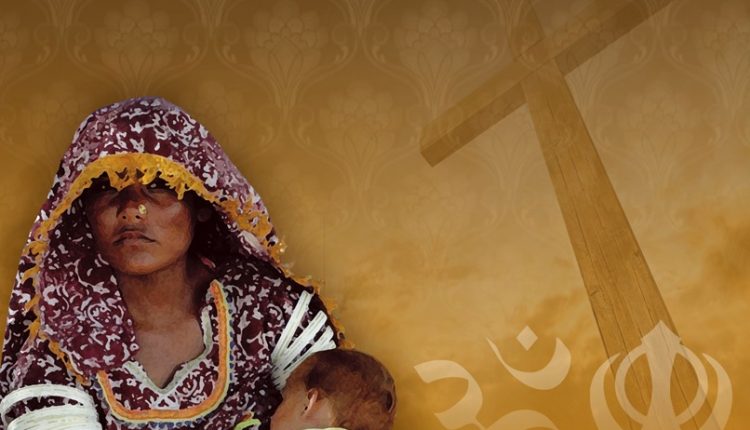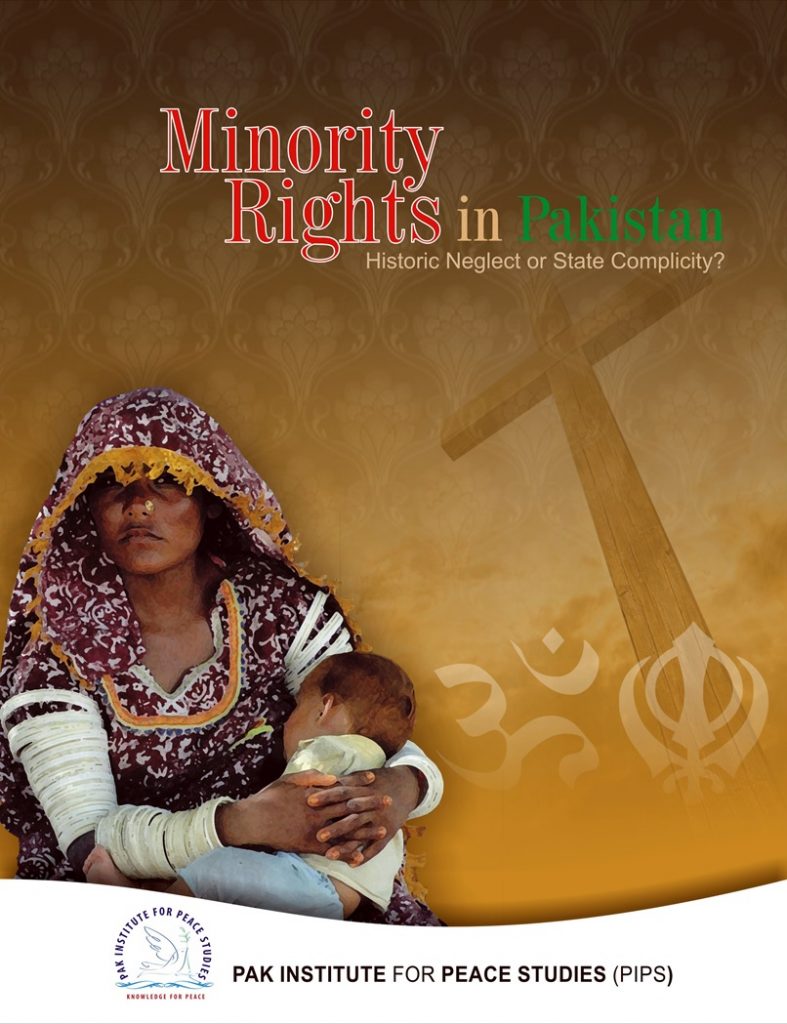Minority Rights in Pakistan: Historic Neglect or State Complicity?


- After Study Hours: Exploring the Madrassah Mindset
- Education for peace and harmony
- Reconstruction of the National narratives and Counter-Violent Extremism Model for Pakistan
- Role of Post-Noon Engagements of Madrassa Students in Radical Orientation
- Promoting Inclusive and Tolerant Educational Narratives
- Islam, Democracy and the Constitution of Pakistan
- Minority Rights in Pakistan: Historic Neglect or State Complicity?
- “Creating an environment that counteracts militant ideologies and radicalism in Pakistan”
- Through Each Other’s Eyes
- The Role of Ulema in Promotion of Peace and Harmony in Society
- Critical Ideologies: A Debate on Takfeer & Khurooj
- سماجی ہم آہنگی ، رواداری اور تعلیم
- سماجی ہم آہنگی کیسے ہو؟
- اسلام جمہوریت اور آئین پاکستان
- پر امن اور متوازن معاشرے کے قیام میں علماء کا کردار
- اسلام جمہوریت اور پاکستان
- ایک دوسرے کے نظر سے
- مسئلہ تکفیر و خروج
- Media Safety in Pakistan
- محفوظ اور ہم آہنگ پاکستان
- Reconstruction of the national narratives and counter-violent extremism model for pakistan
- Secure and Inclusive Pakistan
- تعلیم امن اور ہم آہنگی
- Regulating Broadcast Media: Challenges & Reforms
- Pakistan’s Sectarian Mire & The Way Forward
- Dialogue Pakistan 2019 report
- Pakistan’s achievements in war on terror but at what cost: a special review of the current decade
- Pakistan in changing world order
- Who Am I
- Academic and Intellectual Dialogue on Social Harmony, Tolerance and Education
- Youth Engagement in Pakistan: Baseline Evaluation and Way Forward
- Dialogue Pakistan 2020
- Strengthening Governance in Pakistan
- Youth Perspective on Society, Religion, And Politics
- Supporting the Afghan peace process: Pakistan’s position, interests and policy options
- Afghanistan as Seen from Pakistan I
- Afghanistan as Seen from Pakistan II
- Perspectives from Pakistan on Afghan peace and reconciliation 1
- Discourse with Balochistan Youth on Society, Religion, and Politics
- Perspectives From Pakistan on Afghan Peace and Reconciliation 2
- How Youth in Sindh View State, Religion and Politics
- Afghan Peace and Reconciliation: Pakistan’s Interests and Policy Options II
- Interfaith Relations in Pakistan Perspectives and Worldview of Youth in Punjab
- Afghanistan as Seen from Pakistan III
- Making Sense of Pakistani Youth How Youth in Pakistan View State, Society, Religion, and Politics
- PERSPECTIVES FROM PAKISTAN ON AFGHAN PEACE AND RECONCILIATION 3
- AFGHAN PEACE AND RECONCILIATION: PAKISTAN'S INTERESTS AND POLICY OPTIONS 3
- A Path to Peace
- Countering Violent Extremism on Campuses A Faculty-Oriented Policy Brief
- PERSPECTIVES FROM PAKISTAN ON AFGHAN PEACE AND RECONCILIATION 4
- Afghanistan as Seen from Pakistan IV
- AFGHAN PEACE AND RECONCILIATION: PAKISTAN’S INTERESTS AND POLICY OPTIONS 4
- Afghanistan as Seen from Pakistan V
- AFGHAN PEACE AND RECONCILIATION: PAKISTAN’S INTERESTS AND POLICY OPTIONS 5
- PERSPECTIVES FROM PAKISTAN ON AFGHAN PEACE AND RECONCILIATION 5
- Charter of Peace
- AFGHAN PEACE AND RECONCILIATION: PAKISTAN'S INTERESTS AND POLICY OPTIONS VI
- AFGHANISTAN AS SEEN FROM PAKISTAN-VI
- PERSPECTIVES FROM PAKISTAN ON AFGHAN PEACE AND RECONCILIATION 6
- Youth for interfaith harmony Newsletter 1
- AFGHAN PEACE AND RECONCILIATION: PAKISTAN’S INTERESTS AND POLICY OPTIONS
- PERSPECTIVES FROM PAKISTAN ON AFGHAN PEACE AND RECONCILIATION 7
- AFGHANISTAN AS SEEN FROM PAKISTAN-VII
- YOUTH AND THE SOCIAL CONTRACT IN PAKISTAN
- Pakistan’s Afghan perspective and policy options
- Charter of Peace
- PERSPECTIVES FROM PAKISTAN ON AFGHAN PEACE AND RECONCILIATION 8
- AFGHANISTAN AS SEEN FROM PAKISTAN-VIII
- AFGHAN PEACE AND RECONCILIATION: PAKISTAN'S INTERESTS AND POLICY OPTIONS 8
- AFGHAN PEACE AND RECONCILIATION: PAKISTAN’S INTERESTS AND POLICY OPTIONS 9
- AFGHAN PEACE AND RECONCILIATION: PAKISTAN'S INTERESTS AND POLICY OPTIONS - 11
- Pakistan's Evolving Militant Landscape: State Responses and Policy options
- AFGHAN PEACE AND RECONCILIATION: PAKISTAN’S INTERESTS AND POLICY OPTIONS – 12
- TRENDLINES OF PAKISTAN'S SECURITY CHALLENGES
- After Study Hours: Exploring the Madrassah Mindset
- Minority Rights in Pakistan: Historic Neglect or State Complicity?
- “Creating an environment that counteracts militant ideologies and radicalism in Pakistan”
- Media Safety in Pakistan
- Pakistan’s achievements in war on terror but at what cost: a special review of the current decade
- Pakistan’s CounterExtremism Challenge and Policy Recourse
- MAINSTREAMING THE "TERRORISTS": INTERIM GOVERNMENTS IN AFGHANISTAN & SYRIA
While multiple factors have historically contributed to discrimination against religious minorities and faith-based violence in Pakistan, there have been inadequate efforts on the level of state and society to create an environment that supports interfaith harmony and social cohesion. The processes of Islamisation of the state and society have negatively affected the overall behaviours and attitudes, which are increasingly becoming intolerant and rejecting towards religious minorities in the country. Growing threats to physical security of minority communities from Islamist extremist and militant groups and government’s inaction to counter these threats further compound the problem. This report examines socio-political views and everyday challenges faced by Pakistan’s largest minority communities based on a countrywide survey conducted by the Pak Institute of Peace Studies in 2014 with 327 respondents belonging to Christian, Hindu, Baha’i and Sikh communities from Pakistan’s four provinces: Sindh, Punjab, Khyber Pakhtunkhwa (KPK) and Balochistan. Some of the main objectives of the survey were to study the lives of religious minorities and their relationship with followers of other faiths; explore social, cultural, economic and political aspects of and challenges in day-to-day living shared among followers of different faiths; and identify inter-faith and inter-cultural connectors from Pakistan’s existing composite cultural heritage such as shrines, festivals and folklores etc. The survey findings reveal that discrimination against minorities is connected with overall inequality and government inattention. One of the recurrent themes of this survey reveals a persistent complaint from minority groups about the lack of effective protection accorded by the state against violence, intimidation and intolerance. This survey also finds that most respondents although deeply committed to their faith are able to integrate and live peacefully with other religious groups but feel threatened by the overall deteriorating security situation countrywide. However, a big majority of respondents from all four provinces also believe that they are not part of the larger social and cultural mainstream. This is despite the fact that a considerable number of respondents say they participate freely in cultural and religious festivals along with followers of other religions and have exchange of visits with the latter. Also, most respondents do not experience any problem in business and other transactions with followers of other religions.

